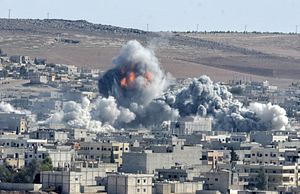Russia has stepped up its military operations in Syria this week, with its navy now joining the air force in targeting forces opposing the rule of embattled leader Bashar al-Assad. Russia insists it is only targeting the Islamic State and terrorist groups; the United States believes Moscow is actually targeting non-IS rebels, especially those backed by American training and weapons. Rebel groups themselves, meanwhile, have accused Russia of occupying Syria and targeting civilians.
What does China think about all this?
The situation is Syria is a geopolitical mess (and a humanitarian disaster). There’s no good solution, regardless of your perspective, and China is no exception. China’s tangled interests in the Syria situation include a number of factors, some of which would seem to suggest Chinese support for Russia’s recent moves and others that pull Beijing in the opposite direction.
China has a general interest in supporting Russia, which has strong ties to Assad, on international issues, with the expectation that Moscow will return the favor. Warming ties between Moscow and Beijing since Chinese President Xi Jinping came to power in 2013 have intensified such cooperation, though it was evident under Hu Jintao as well. On the Syria issue, this has led to China and Russia acting in concert to veto four separate UN Security Council resolutions since 2011. China was also unwilling to criticize Russia for its annexation of Crimea in 2014, which went against China’s long-standing insistence on the inviolable nature of national sovereignty.
Beyond broad geopolitics, China and Russia share a specific distaste for U.S. military interventions, particularly when the stated goal is regime change. Thus Beijing is critical of the U.S. policy of training and supporting certain rebel groups in their fight against Assad. The fact that Moscow is now bombing those U.S.-backed rebels is likely seen as just deserts by China’s leadership.
China itself generally tends to support incumbent governments over challenges to their authority, regardless of the circumstances. When the United States began conducting airstrikes against Islamic State in Syria, one of China’s main concerns was that Washington had not received approval from the Assad government to do so (though Beijing approved of the counter-terrorism aspects of the decision). Russia, however, is working with Assad, a fact that does a great deal to legitimize its military actions in Beijing’s eyes. China itself, as David Volodzko has pointed out for The Diplomat, has a long history of providing weapons to the Assad regime.
China’s government has largely stayed out of the recent developments in Syria (aided by a week-long national holiday, meaning no press conferences or official statements from government offices). But Beijing’s state news agency, Xinhua, provides some insight into Beijing’s thinking on the issue.
One primer from Xinhua, seeking to answer the question of why Russia is increasing its involvement in Syria, pointed to five factors: the Syrian government forces are increasingly weak; the U.S. airstrikes against IS have been ineffective (because, the article says, Washington was not willing to work with Assad); IS is more and more of a threat; Syria is a humanitarian disaster; and, finally, Russia is seeking to defend its own interests in Syria (by countering extremists). The general picture is of Russia intervening to protect Syria from IS — the same perspective Moscow is providing.
Another Xinhua article is more clear-eyed about the geopolitics involved. Asking the question “What game is Putin playing?”, this piece views the Russian intervention in Syria as part of a larger chess match between the U.S. and Russia. Military intervention in Ukraine helped Putin achieve his goals, the article says; Putin is pursuing a similar policy in Syria to back up his repeated statements that the West must cooperate with Assad to fight IS (and, in doing so, cease their efforts to unseat the current Syrian regime).
In other pieces, Xinhua has repeated Russia’s insistence that it is only targeting terrorist groups, though it cites U.S. rejections of that explanation as well. Xinhua has also underlined comments by Russian officials that its ultimate goal is a political solution – an attitude much more in line with China’s own position.
It’s clear from the Xinhua pieces that China’s state media understands Russia’s motives, and may even sympathize with them (particularly when it comes to Russia’s desire to stymie U.S. efforts at regime change). But the means Russia has chosen – airstrikes and missile launches – are not a course of action Beijing is likely to condone.
For one thing, China needs stability in the Middle East, a crucial source of Chinese oil imports; more violence in Syria is not going to help in this regard. And more importantly, China’s first principle on the Syrian situation has been (and continues to be) that “the Syrian issue must be resolved through political means. Military action is no answer to it.” That statement, delivered by a Foreign Ministry spokesperson in response to a question about Russia’s actions, hardly sounds like a ringing endorsement of the military intervention.
In all likelihood, China will continue to keep a low profile on the Syria issue, just as it has for the past four years. That means, even while China’s official media shows sympathy for Russia’s position, officially Beijing will call for peaceful solutions and negotiations – a tacit rebuke to all sides involved in the violence.

































